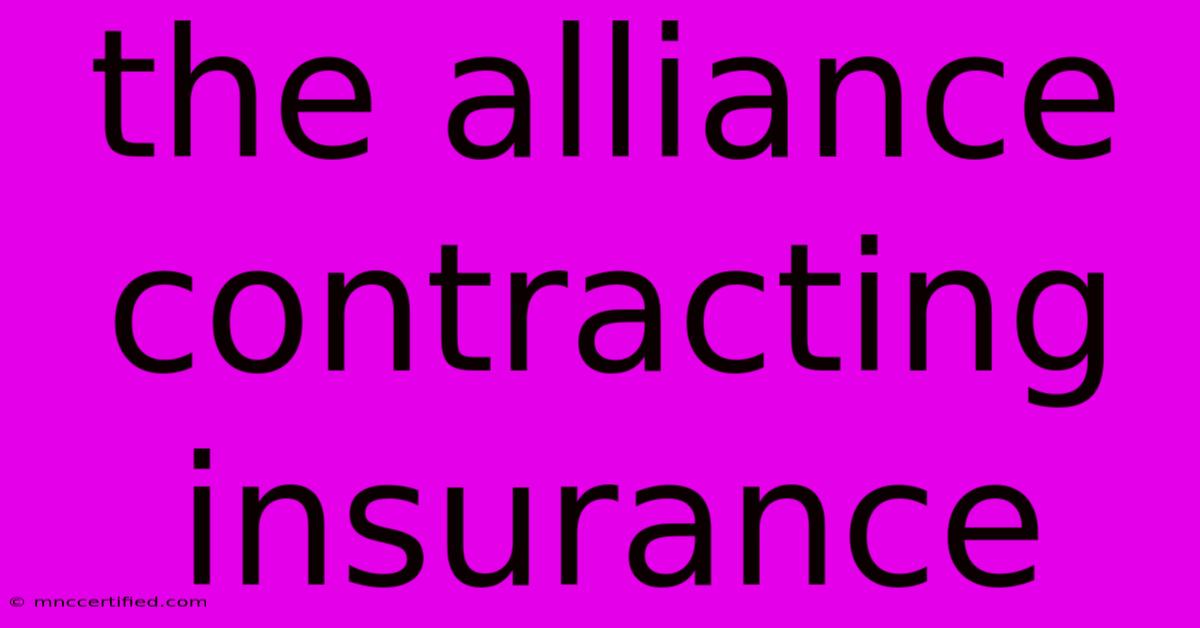The Alliance Contracting Insurance

Table of Contents
The Alliance Contracting Insurance: A Comprehensive Guide for Contractors
The construction industry is fraught with risks. From workplace accidents to property damage and legal disputes, contractors face a multitude of potential liabilities. That's where robust insurance coverage becomes crucial, and understanding the nuances of your policy is paramount. This comprehensive guide delves into Alliance Contracting Insurance, examining its key features, benefits, and how it can protect your business.
Understanding Alliance Contracting Insurance
Alliance Contracting Insurance (while not an actual insurance company, this title serves as a placeholder for any contractor's alliance with insurance providers) isn't a single, specific policy. Instead, it represents the collective insurance needs of a contracting business, typically encompassing several types of coverage working together to provide comprehensive protection. The specific policies you'll need will depend heavily on the size and type of your contracting business, the scope of your projects, and your geographical location.
Key Components of Comprehensive Contractor Insurance:
-
General Liability Insurance: This is the cornerstone of any contractor's insurance portfolio. It protects your business from claims of bodily injury or property damage caused by your work or your employees. Think of a client tripping on a tool left at a job site – general liability would cover the resulting medical bills and potential lawsuit. Keyword: General Liability Insurance for Contractors
-
Workers' Compensation Insurance: This is legally mandated in most jurisdictions and covers medical expenses and lost wages for employees injured on the job. Failing to have adequate Workers' Compensation coverage can lead to severe penalties. Keyword: Workers Compensation Insurance for Contractors
-
Commercial Auto Insurance: If your business uses vehicles for transportation of equipment or employees, commercial auto insurance is essential. It covers accidents and damages involving company vehicles. Keyword: Commercial Auto Insurance for Contractors
-
Professional Liability Insurance (Errors and Omissions): This protects against claims of negligence or mistakes in your professional services. For example, if a design flaw in your work causes damage, this insurance could cover the costs of rectifying the issue and potential legal fees. Keyword: Errors and Omissions Insurance for Contractors
-
Umbrella Liability Insurance: This provides an extra layer of protection beyond your general liability and other policies, offering higher limits of coverage in case of a catastrophic event or major lawsuit. Keyword: Umbrella Liability Insurance for Construction
-
Builder's Risk Insurance: This crucial policy covers damage to a project during construction, protecting your financial investment if a fire, storm, or other unforeseen event occurs. Keyword: Builder's Risk Insurance
The Benefits of Adequate Insurance Coverage
The financial implications of a lawsuit or significant accident can cripple even the most successful contracting business. Adequate insurance offers several crucial benefits:
- Financial Protection: The primary benefit is safeguarding your business's finances from unexpected costs associated with accidents, lawsuits, or property damage.
- Legal Representation: Many insurance policies include legal defense coverage, providing access to experienced attorneys in the event of a claim.
- Business Continuity: Insurance allows your business to continue operating smoothly even after a significant event, preventing financial ruin.
- Client Confidence: Having adequate insurance reassures clients of your professionalism and commitment to safety, boosting your reputation and attracting new business. Keyword: Contractor Insurance for Client Confidence
Finding the Right Alliance for Your Contracting Business
Choosing the right insurance provider is critical. Look for insurers specializing in the construction industry, as they understand the unique risks involved. Consider factors like:
- Coverage Limits: Ensure the policy limits are sufficient to cover potential losses.
- Premiums: Compare premiums from different insurers to find the best value.
- Reputation and Financial Stability: Choose a reputable insurer with a strong financial standing to ensure claims are paid promptly.
- Customer Service: Good customer service is essential for a positive experience.
Conclusion: Protecting Your Business is an Investment
Securing the right Alliance Contracting Insurance—meaning a comprehensive suite of policies tailored to your business needs—isn't an expense; it's a crucial investment in the long-term success and stability of your contracting company. By thoroughly understanding your risks and securing appropriate coverage, you can protect your business, your employees, and your clients, ensuring a prosperous future. Remember to regularly review and update your insurance coverage to reflect the evolving needs of your business.

Thank you for visiting our website wich cover about The Alliance Contracting Insurance. We hope the information provided has been useful to you. Feel free to contact us if you have any questions or need further assistance. See you next time and dont miss to bookmark.
Featured Posts
-
Friday Football Accumulator 18 1 Nations League Punt
Nov 16, 2024
-
General Liability Insurance Alaska
Nov 16, 2024
-
Landman Review Sheridans Decent Western
Nov 16, 2024
-
Asset Protection Renters Insurance
Nov 16, 2024
-
Tyson Slaps Paul Weigh In Chaos
Nov 16, 2024